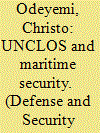| Srl | Item |
| 1 |
ID:
143848


|
|
|
|
|
| Summary/Abstract |
The article examines the influence of BRICS (Brazil, Russia, India, China, and South Africa) members that acts as an important condition of success for implementation of the three-pillared Responsibility to Protect (R2P) principle in case of Syrian conflict. Analysis has revealed two distinctive features of the BRICS’s positions. Firstly, BRICS has placed particular emphasis on there being a reasonable prospect of success before supporting intervention. Secondly, BRICS’s opposition to military intervention arises perhaps not so much from the regime change issue in Libya as the reality that many of the draft resolutions sponsored by the United States–France–United Kingdom (P3) alliance accused President Bashar Assad’s regime of mass atrocity crimes without levying the same accusation against the rebels fighting the regime.
|
|
|
|
|
|
|
|
|
|
|
|
|
|
|
|
| 2 |
ID:
142034


|
|
|
|
|
| Summary/Abstract |
This Critical Comment seeks to situate the United Nations Convention on the Law of the Sea (UNCLOS) within the context of South China Sea (SCS) dispute. Bearing in mind that maritime actions of the main disputants – China, Vietnam, and the Philippines – increasingly “securitise” these long-standing disputes and vice versa, the study examines the concept of a maritime “regime complex.” Whereas efforts have being made to examine UNCLOS and indeed the dispute within the framework of a maritime “regime complex,” the key finding shows that the increased “securitisation” of the disputes makes it difficult to envisage effective engagement of UNCLOS as a resolution mechanism. It will also reveal that China's firmly established expansionist agenda in the SCS region is indicative of Beijing's susceptibility to compromise a diplomatic solution to these long-standing disputes. These discoveries are structured around the knowledge that the spatial relation of the SCS critically espouses not only its geo-strategic significance in terms of natural resources endowment, but also the enduring maritime disputes within the region.
|
|
|
|
|
|
|
|
|
|
|
|
|
|
|
|